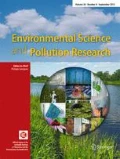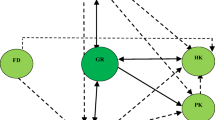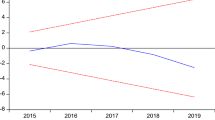Abstract
The role of energy cannot be passed over in the process of economic growth and development in any economy. China consumes colossal quantity of energy; thus, the central objectives of this study is to empirically evaluate the linkages among energy use, environment by CO2 emissions, human health by health expenditures, Foreign Direct Investment (FDI) inflows, and real GDP per capita used for economic growth over the period of 1995–2016 for China. The nature of the data directed to employ the Canonical cointegrating regression (CCR) method for unknown parameter estimation. Four equations have estimated namely for FDI, health, environment, and economic growth. The result for China during the period under the study reveals that energy consumption has significant positive impact on FDI, health, environment, and economic growth. The study results suggest that policy makers need to chalk out effective policy for effective utilization of energy so as to encourage permissible economic growth and development in China.
Similar content being viewed by others
References
Abdouli M, Hammami S (2017a) The impact of FDI inflows and environmental quality on economic growth: an empirical study for the MENA countries. J Knowl Econ 8(1):254–278
Abdouli M, Hammami S (2017b) Exploring links between FDI inflows, energy consumption, and economic growth: further evidence from MENA countries. J Econ Dev 42(1):95–117
Ahmad S, Mathai M, Parayil G (2014) Household electricity access, availability and human well-being: evidence from India. Energy Policy 69:308–315
Ahmed M, Azam M (2016) Causal nexus between energy consumption and economic growth for high, middle and low income countries using frequency domain analysis. Renew Sust Energ Rev 60:653–678
Amri F (2017) Carbon dioxide emissions, output, and energy consumption categories in Algeria. Environ Sci Pollut Res 24(17):14567–14578
Ang JB (2007) CO2 emissions, energy consumption and output in France. Energy Policy 35:4772–4778
Apergis N, Payne JE (2009a) Energy consumption and economic growth: evidence from the commonwealth of independent states. Energy Econ 31(5):641–647
Apergis N, Payne J (2009b) CO2 emissions, energy usage and output in Central America. Energy Policy 37:3282–3286
Azam M, Khan AQ (2017) Growth-corruption-health Triaca and environmental degradation: empirical evidence from Indonesia, Malaysia and Thailand. Environ Sci Pollut Res 24:16407–16417
Azam M (2016) Does environmental degradation shackle economic growth? A panel data investigation on 11 Asian countries. Renew Sust Energ Rev 65:175–182
Azam M, Khan AQ, Abdullah H, Qureshi IM (2016) The impact of CO2 emissions on economic growth: evidence from selected higher CO2 emissions economies. Environ Sci Pollut Res 23(7):6376–6389
Blanco L, Gonzalez F, Ruiz I (2013) The impact of FDI on CO2 emissions in Latin America. Oxf Dev Stud 41(1):104–121
Belke A, Dreger C, Haan F D (2011)Energy consumption and economic growth: New insights into the cointegration relationship. Energy Econ 33(5):782–789
BP Energy Outlook (2017) 2017 edition. Retrieved https://www.bp.com/content/dam/bp/pdf/energy-economics/energy-outlook-2017/bp-energy-outlook-2017.pdf. Accessed 6 July 2018
Braun RA (1994) How large is the optimal inflation tax? J Monet Econ 34:201–214
Chen J, Xie Y, Li W (2013) Health impact assessment of Beijing’s residents in exposure of chief air pollutants from 2010 to 2015 based on energy consumption scenarios. Procedia Environ Sci 18:277–282
Chen S (2012) Energy consumption and economic growth in China: new evidence from the co-integrated panel VAR model. J Int Energy Policy 1(2):51–64
Costa-Font J, Hernandez-Quevedo C, Sato A (2013) A Health Kuznets Curve? cross-country and longitudinal evidence. CESifo Working Paper N° 4446
Cui H (2016) China’s economic growth and energy consumption. Int J Energy Econ Policy 6(2):349–355
Dickey D, Fuller W (1979) Distribution of the estimators for autoregressive time series with a unit root. J Am Stat Assoc 74:427–431
Gul S, Zou X, Hassan CH, Azam M, Zaman K (2015) Causal nexus between energy consumption and carbon dioxide emission for Malaysia using maximum entropy bootstrap approach. Environ Sci Pollut Res 22(24):19773–19785
Halicioglu F (2009) An econometric study of CO2 emissions, energy consumption, income and foreign trade in Turkey. Energy Policy 37:1156–1164
Hou Q (2009) The relationship between energy consumption growths and economic growth in China. Int J Econ Financ 1(2):232–237
Jalil A, Mahmud SF (2009) Environment Kuznets curve for CO2 emissions: a cointegration analysis for China. Energy Policy 37:5167–5172
Jayanthakumaran K, Verma R, Liu Y (2012) CO2 emissions, energy consumption, trade and income: a comparative analysis of China and India. Energy Policy 42:450–460
Jebli MB, Youssef SB, Apergis N (2015) The dynamic interaction between combustible renewables and waste consumption and international tourism: the case of Tunisia. Environ Sci Pollut Res 22:12050–12061
Jebli MB, Youssef SB (2015) The environmental Kuznets curve, economic growth, renewable and non-renewable energy, and trade in Tunisia. Renew Sust Energ Rev 47:173–185
Jin T, Kim J (2018) Coal consumption and economic growth: panel cointegration and causality evidence from OECD and non-OECD countries. Sustainability 10(660):1–15
Johansen S (1988) Statistical analysis of cointegration vectors. J Econ Dyn Control 12(2–3):231–254
Johansen S (1991) Estimation and hypothesis testing of cointegration vectors in Gaussian vector autoregressive models. Econometrica 59:1551–1580
Johansen S (1995) Likelihood-based inference in cointegrated vector autoregressive models. Oxford University Press, New York
Keeley AR, Matsumoto K (2018) Investors’ perspective on determinants of foreign direct investment in wind and solar energy in developing economies—review and expert opinions. J Clean Prod 179:132–142
Kizilkaya O (2017) The impact of economic growth and foreign direct investment on CO2 emissions: the case of Turkey. Turk Econ Rev 4(1):106–118
Kivyiro P, Arminen H (2014) Carbon dioxide emissions, energy consumption, economic growth, and foreign direct investment: causality analysis for sub-Saharan Africa. Energy 74:595–606
Li H, Li B, Lu H (2017) Carbon dioxide emissions, economic growth, and selected types of fossil energy consumption in China: empirical evidence from 1965 to 2015. Sustainability 9(697):1–14
Markandya A, Wilkinson P (2007) Electricity generation and health. Lancet 370(9591):979–990
Merican Y, Yusop Z, Noor ZM, Hook LS (2007) Foreign direct investment and the pollution in five ASEAN nations. Int J Econ Manag 1(2):245–261
Odhiambo NM (2009) Energy consumption and economic growth nexus in Tanzania: an ARDL bounds testing approach. Energy Policy 37:617–622
Odularu GO, Okonkwo C (2009) Does energy consumption contribute to economic performance? Empirical evidence from Nigeria. J Econ Bus XII(2):43–79
Orem W, Tatu C, Pavlovic N, Bunnell J, Kolker A, Engle M, Stout B (2010) Health Effects of Energy Resources Fact Sheet 2009–3096. U.S. Geological Survey 12201 Sunrise Valley Drive, MS 956 Reston, VA 20192
Omri A, Kahouli B (2014) Causal relationships between energy consumption, foreign direct investment and economic growth: fresh evidence from dynamic simultaneous-equations models. Energy Policy 67:913–922
Ogaki M (1993) Canonical cointegrating regressions: a user’s guide. Rochester Center for Economic Research Working Paper 349, University of Rochester
Ozturk Z, Oz D (2016) The relationship between energy consumption, income, foreign direct investment, and CO2 emissions: the case of Turkey. J Fac Econ Adm Sci 6(2):69–288
Park JY (1992) Canonical cointegrating regressions. Econometrica 60(1):119–143
Peng H, Tan X, Li Y, Hu L (2016) Economic growth, foreign direct investment and CO2 emissions in China: a panel granger causality analysis. Sustainability 8(233):1–13
Phillips PCB, Perron P (1988) Testing for a unit root in time series regression. Biometrika 75(2):335–346
PHAA (2015) Public health association of Australia: policy-at-a-glance—health effects of fossil fuels policy. PHAA’s Ecology & Environment Special Interest Group (SIG). https://www.phaa.net.au/documents/item/868
Pradhan RP (2010) Energy consumption-growth nexus in SAARC countries: using cointegration and error correction model. Mod Appl Sci 4(4):74–79
Rapu CS, Adenuga AO, Kanya WJ, Abeng MO, Golit PD, Hilili MJ, Uba IA, Ochu ER (2015) Analysis of Energy Market Conditions in Nigeria Occasional Paper No. 55 Central Bank of Nigeria
Saidi K, Hammami S (2014) Energy consumption and economic growth nexus: empirical evidence from Tunisia. Am J Energy Res 2(4):81–89
Shiu A, Lam P-L (2004) Electricity consumption and economic growth in China. Energy Policy 32:47–54
Skanderson DM (1994) Evidence on the fisher equation: the long run and the short run, PhD Dissertation. University of Rochester, Rochester New York
Smith KR, Balakrishnan K, Butler C, Chafe Z, Fairlie I, Kinney P, Kjellstrom T, Mauzerall DL, McKone T, McMichael A, Schneider M (2012) Chapter 4—wnergy and health. In Global Energy assessment - toward a sustainable future. Cambridge University press, Cambridge and New York and the International Institute for Applied Systems Analysis, Laxenburg, pp. 255–324
Smith KR, Frumkin H, Balakrishnan K, Butler CD, Chafe ZA, Fairlie I, Kinney P, Kjellstrom T, Mauzerall DL, McKone TE, McMichael AJ, Schneider M (2013) Energy and human health. Annu Rev Public Health 34:159–188
Smith KR, Ezzati M (2005) How environmental health risks change with development: the epidemiologic and environmental risk transitions revisited. Annu Rev Environ Resour 30:291–333
Toman M, Jemelkova B(2003) Energy and economic development: an assessment of the state of knowledge. Discussion paper 03–13. Resources for the Future 1616 P Street, NW Washington, D.C. 20036
World Economic Forum (2012) Energy for economic growth: energy vision update 2012, retrieved from http://reports.weforum.org/energy-for-economic-growth-energy-vision-update-2012
Wang Y, Wang Y, Zhou J, Zhu X, Lu G (2011) Energy consumption and economic growth in China: a multivariate causality test. Energy Policy 39(7):4399–4406
World Development Indicators (2018) The World Bank. http://wdi.worldbank.org/tables
World Energy Outlook (2004) Chapter 10: energy and development. IEA Publications, Paris, pp. 329–365
Yoo S-H (2006) The causal relationship between electricity consumption and economic growth in the ASEAN countries. Energy Policy 34:3573–3582
Youssef AB, Lannes L, Rault C, Soucat A (2016) Energy consumption and health outcomes in Africa. J Energy Dev 41(1/2):175–200
Zeren F (2015) The impact of foreign direct investment on CO2 emission: pollution halo or pollution haven hypothesis? J Yasar Univ 10(37):6442–6448
Zhang YJ (2011) The impact of financial growth on carbon emissions: an empirical analysis in China. Energy Policy 39:2197–2203
Zou X, Azam M, Islam T, Zaman K (2016) Environment and air pollution like gun and bullet for low income countries: war for better health and wealth. Environ Sci Pollut Res 23(4):3641–3657
Author information
Authors and Affiliations
Corresponding author
Ethics declarations
Ethical statement
The manuscript has not been previously published, is not currently submitted for review to any other journal, and will not be submitted elsewhere before a decision is made by this journal.
Additional information
Responsible editor: Philippe Garrigues
Publisher’s note
Springer Nature remains neutral with regard to jurisdictional claims in published maps and institutional affiliations.
Rights and permissions
About this article
Cite this article
Azam, M., Khan, A.Q. & Ozturk, I. The effects of energy on investment, human health, environment and economic growth: empirical evidence from China. Environ Sci Pollut Res 26, 10816–10825 (2019). https://doi.org/10.1007/s11356-019-04497-4
Received:
Accepted:
Published:
Issue Date:
DOI: https://doi.org/10.1007/s11356-019-04497-4




